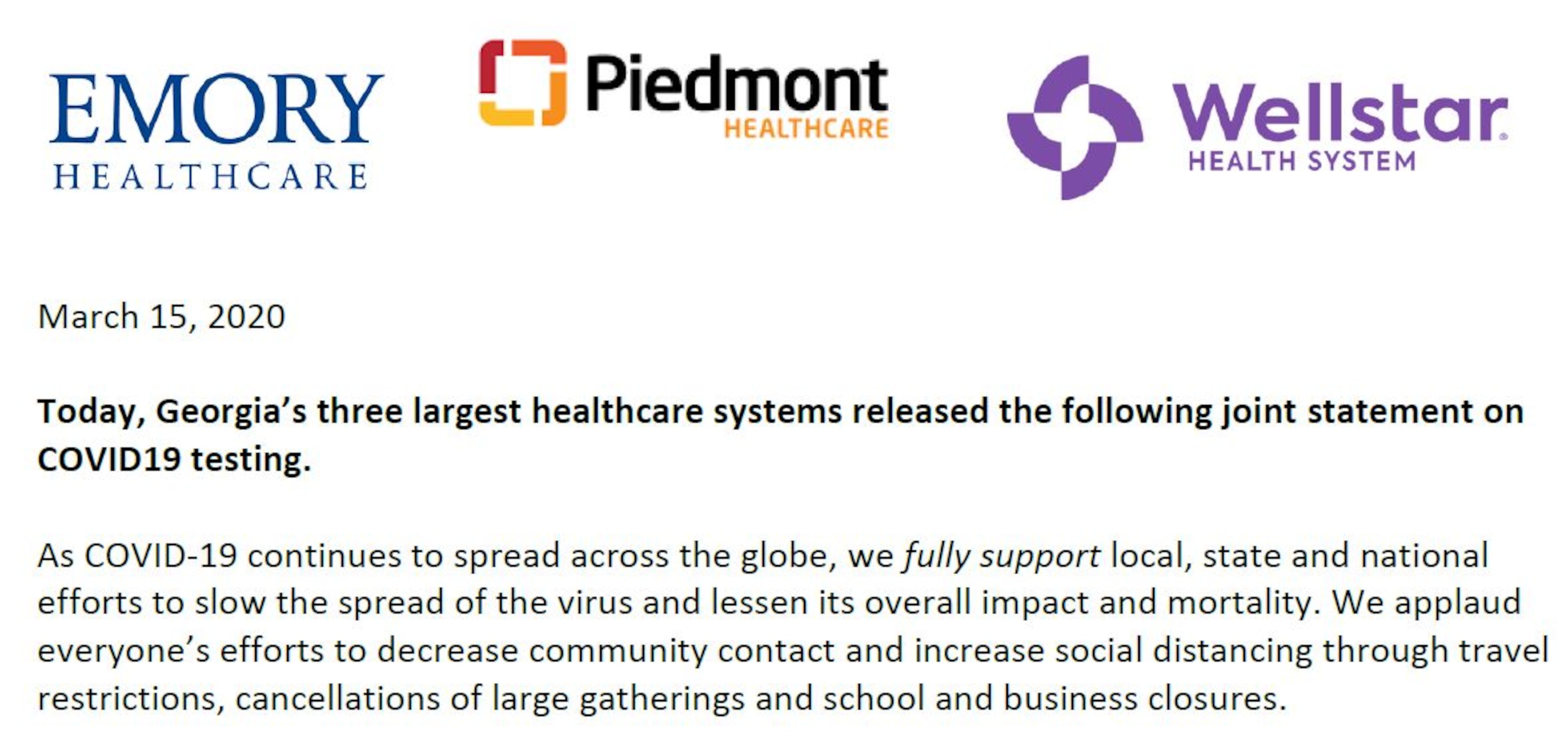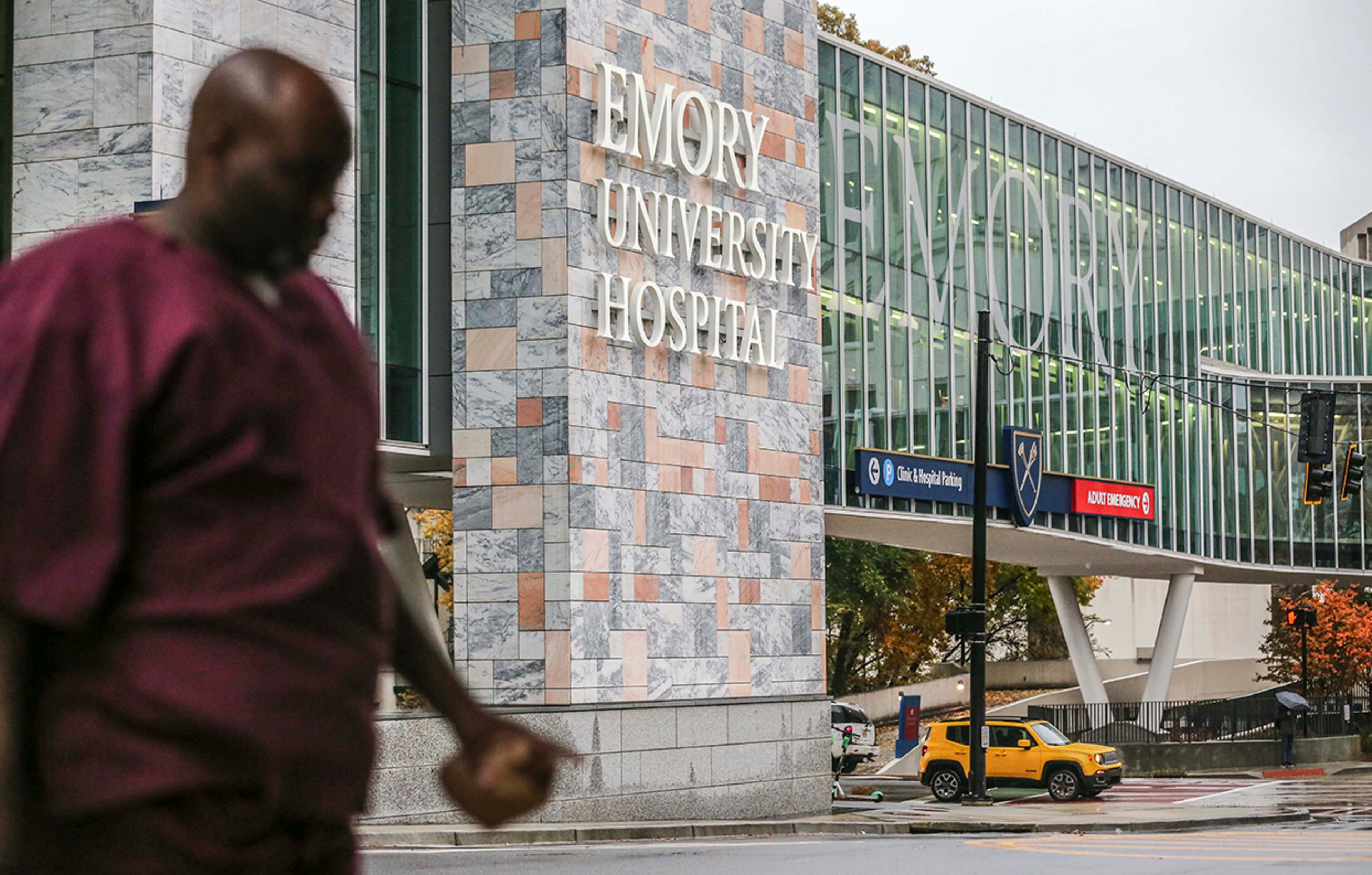As hospitals fight to keep up, they tell mild cases not to seek tests
Underscoring the continued challenges of widespread coronavirus testing, three of Georgia’s largest hospital systems urged people on Monday not to come to hospitals to be tested if they have mild or moderate symptoms.
"Inundating hospitals and doctors' offices for testing by patients who can be managed at home, we believe, will worsen the impact of COVID-19," read the statement from Emory Healthcare, Piedmont Healthcare and Wellstar Health System.
“The majority of patients can safely recover at home with self-isolation and symptomatic treatment,” the joint statement said.
» COMPLETE COVERAGE: Coronavirus in Georgia
» RELATED: Preparing for surge, hospitals limit visitors, reschedule surgeries
While the hospital systems said testing for everyone was a goal, there are too few tests to go around and hospitals face a shortage of protective gear that staff must wear when testing or treating patients.
“The national message is there are millions of these tests out there and the reality is very far from that, at least here in Georgia,” said Dr. Jonathan Lewin, CEO of Emory Healthcare, which operates 10 metro area hospitals.
Georgia got a glimmer of good news late Monday when Swiss medical giant Roche agreed to provide kits to Emory to enhance local testing and processing efforts by about 200 tests per day.
Billions of federal emergency dollars have been appropriated to combat the virus, including for testing. President Donald Trump has promised tests for anyone who wants them, but it will take time to manufacture materials needed, deploy the tests and expand lab capacity. Lewin said the state, CDC and private labs are working as fast as they can, but the issue is capacity.
“We want to educate the community that people with mild to moderate symptoms who do not require hospitalization, do not require testing,” the memo said. “Since the health care community’s local testing capacity and supply of personal protective equipment is stretched thin, we must work together to serve our patients and our health care providers.”

For now, the tests are still being rationed. The state Department of Public Health (DPH) said testing is prioritized for hospitalized patients with severe illness, health care workers and first responders, those working in long-term care settings and people living in congregate settings where the disease can spread quickly.
The DPH announced Monday the number of confirmed COVID-19 cases had risen to 121 from 99 a day earlier. But experts say the true number of cases is likely far higher, and hospitals around the state told the AJC their beds were filing up with sick patients.
Nancy Nydam, a DPH spokeswoman, said for most COVID-19 patients a lab confirmation of coronavirus testing “does not change the care they would receive.”
DPH has established a COVID-19 hotline at (844) 442-2681. The department urges people experiencing symptoms to contact their medical provider.
» RELATED: Georgia's first senior care coronavirus cases reported
» MORE: Nine doctors test positive for coronavirus, according to Gupta
The call to stay away from hospitals unless symptoms are severe reflects both an issue of testing capacity and need to prevent exposure, Nydam said.
The Georgia Public Health Lab had processed 447 tests for a total of 308 individuals from March 5 through Sunday, state officials said. Early test guidance from the Centers for Disease Control and Prevention required two specimen tests per person, but newer guidance requires a single specimen.
The state lab’s testing capacity is 100 per day, ramping up to 200 tests per day soon, state officials said. Private labs also can process tests, but the total daily capacity from all providers isn’t fully known.
In an interview with The Atlanta Journal-Constitution, Lewin said limited testing capacity is straining Georgia’s health care network. Testing for COVID-19 currently takes three to four days, and hospitals across the region have backlogs of patients awaiting test results.
Many of those suspected coronavirus patients are hospitalized, Lewin said. Hospitals must treat all presumed COVID-19 patients as if they have the disease and hold them in strict isolation for days as they await results.
For patients who turn out not to have the disease, the delay means “we’re having to keep them in heavy levels of isolation and we’re using up resources for people who have the disease and need them,” Lewin said.

Emory and other hospitals are trying to increase testing capabilities and expanding test sites on their campuses.
Earlier this month, Emory sought federal permission to acquire two or three large-scale Roche testing devices that would each be capable of performing about 1,000 tests per day.
Lewin said Emory also requested permission to purchase testing kits and sophisticated parts and chemicals to supply a Roche device that Emory’s lab currently owns to test for the virus. That request was backed by Gov. Brian Kemp and Dr. Kathleen Toomey, the state’s commissioner of public health, who sent a letter to CDC and Roche requesting Emory receive prioritized access to a Roche reagent, a specialized compound used in testing.
Late Monday, Roche said it would supply the requested kits. But a decision on the large-scale machines is pending.
“Support of the CDC and government partners helped us to ensure Georgia has this capability,” said Dr. Bryce Gartland, Emory’s hospital group president.
The James M. Cox Foundation, the charitable arm of Cox Enterprises, the parent company of the AJC, has offered up to $5 million to help Emory acquire the Roche testing machines.
Lewin said Emory will continue to press its case with for the Roche machines and is exploring other partnerships to expand local testing capacity. These include partnerships with Georgia Tech and another with a startup tied to Massachusetts General Hospital and Stanford University.
“We’re looking at every possibility,” he said.
Staff writers Greg Bluestein and Helena Oliviero contributed to this report.


